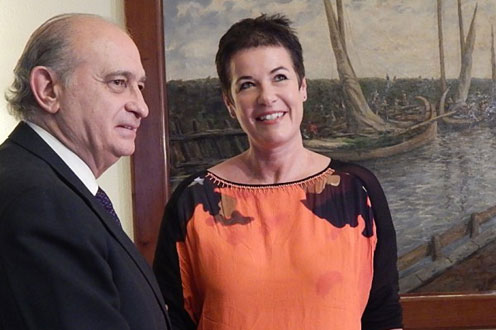Minister for Home Affairs explains future asylum services in Ceuta and Melilla to UNHCR representative in Spain
News - 2015.1.8
The Minister for Home Affairs, Jorge Fernández Díaz, met on Thursday afternoon with the UNHCR representative in Spain, Francesca Friz-Prguda, at an event that was also attended by the State Secretary for Security, Francisco Martínez, and the Director-General for Home Affairs Policy, Cristina Díaz.
At the meeting, Jorge Fernández Díaz informed the UNHCR representative in Spain about that the plans to implement services aimed at helping those people requesting international protection at the border crossings in Ceuta and Melilla.
Jorge Fernández Díaz told her that these centres will be clearly identified as places for formally requesting asylum or international protection, thereby avoiding the need for applicants to leave the border crossing area. Furthermore, he stressed that these services, which will include legal aid and an interpreter at all times, will identify all immigrants applying for international protection. This means it will be possible for such individuals to formally submit their application to the competent authorities - officers of the Spanish National Police Force, in this case.
Furthermore, the Minister for Home Affairs recalled that immigrants will not be required to remain at the border crossing facilities during the time it takes for their applications to be processed but will be able to stay in Ceuta and Melilla, either at the Temporary Immigration Shelter (CETI) or in private accommodation. This constitutes an improvement in terms of their rights and guarantees.
The project, which the Spanish minister explained to the UNHCR representative in Spain, is expected to be launched in March 2015 and Jorge Fernández Díaz invited the European Commissioner for Migration, Home Affairs and Citizenship, Dimitris Avramopoulos, to attend the inauguration.
Jorge Fernández Díaz said that both Ceuta and Melilla experience strong migratory pressure due to their status as the only land borders between the European Union and Africa. In this regard, the Spanish minister recalled that Ceuta and Melilla are especially unique and that the phenomenon of illegal immigration is an issue of vital importance that should be tackled urgently by the European Union under a principle of shared responsibility.





